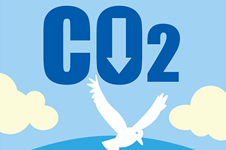2024 Review of the Seventh Daihatsu Environmental Action Plan (2025 Targets)
-
Basic Philosophy / Fundamental Approach / Overall Image of Initiatives
-
Daihatsu Group Environmental Action Plan 2030
-
2024 Review of the Seventh Daihatsu Environmental Action Plan (2025 Targets)
Daihatsu has formulated the Environmental Action Plan 2030 (medium-term goals) and is proactively addressing environmental issues.
We are implementing a total of 15 action items under the Seventh Daihatsu Environmental Action Plan 2021–2025. A review of 2024 is as follows.

Low Carbon Society
【Products】
We will contribute to constructing a low carbon society by reducing global CO2 emissions from new vehicles.
| Action Items | Specific Actions and Targets | Progress Results in 2024 |
|---|---|---|
| Improve fuel efficiency to reduce global CO2 emissions from new vehicles |
Reduce global CO2 emissions from new vehicles by 30% compared with 2010 levels (Japan)
(Overseas)
|
2023 and 2024: 26% reduction compared with 2010 levels |
| Develop mobility powered by diverse energy sources |
|
Implemented the HEV Rocky Currently developing a BEV system to be installed in mini commercial van BEVs in collaboration with Suzuki Motor and Toyota Motor |
| Reduce exhaust gas emissions to contribute to improving urban atmospheric conditions in each country and region | Develop low-concentration exhaust gas technology and steadily introduce low exhaust emission vehicles into markets for contributing to improving urban atmospheric condition in each country and region | Japan: Completed exhaust gas adaptation in WLTC mode Overseas: Compliant with Euro 5 and 6 emission regulation in Ayla and Axia |
| Promote environmental management at the development stage |
Develop and manage progress of environmental targets using eco-vehicle environmental assessment system (Eco-VAS*) at the new vehicle development planning stage * Eco-Vehicle Assessment System (environmental assessment system for vehicle development). Comprehensive environmental evaluation system used to set environmental targets based on the life cycle assessment (LCA) concept of production, customer use, and disposal at the planning stage and ensuring their steady achievement |
Confirmed life cycle CO2 emission reduction for the Move series compared to the previous model |
[Production / Renewable Energy]
Aiming to achieve the plant zero CO2 emissions challenge by 2050 and the 2030 milestones, Daihatsu will promote activities in accordance with its own road map to steadily achieve the targets set by backcasting.
| Action Items | Specific Actions and Targets | Progress Results in 2024 |
|---|---|---|
| Reduce environmental load through efficient production activities |
Reduce CO2 emissions from production by 30% compared with fiscal 2014 levels (Scope: Daihatsu and its production subsidiaries)
|
Reduced CO2 emissions from plants by 28% compared with 2013 levels through activities described on the left |
| Promote technological innovations for CO2 emissions reduction |
|

Recycling Society
We will promote the development of items to be installed in new models launched from 2030 to 2035 and after-treatment systems, in accordance with the road map, aiming to achieve Car-to-Car recycling by 2050, which will utilize the resources of end-of-life vehicles for new vehicle production.
| Action Items | Specific Actions and Targets | Progress Results in 2024 |
|---|---|---|
| Promote easy to dismantle 3R design |
Contribute to promoting recycling of resources by expansion and modeling of the easy to dismantle 3R* design * 3Rs: Reduce, Reuse, Recycle |
Launched company-wide initiatives to tackle the Japan Automobile Manufacturers Association voluntary targets announced in September 2024. Currently promoting the use of recycled material in vehicles produced in the future. Also began preparing to distribute information on components recommended for recycling as a way of addressing the Automobile Recycling Incentive Program launching in 2026. |
| Contribute worldwide through end-of-life vehicle treatment and recycling technology developed in Japan | Respond appropriately without delay to local recycling-related laws and regulations in each country | Compliance with overseas laws and regulations when necessary |
| Develop 3R technologies and systems for rare resources and end-of-life vehicles/parts |
|
|

Society in Harmony with Nature
We will vigorously implement social contribution harmony-with-nature activities to foster an eco-friendly mindset in employees and develop eco-friendly human resources, with the aim of playing a leading role in harmony-with-nature activities in local communities.
| Action Items | Specific Actions and Targets | Progress Results in 2024 |
|---|---|---|
| Promote the All Daihatsu Green Wave Project, naturefocused activities to pass on communities with rich natural diversity to future generations |
Promote forest conservation activities Promote sites that coexist in harmony with nature
|
|
| Promote KOTODUKURI and HITODUKURI through harmony-with-nature activities | Expand various community contribution activities related to harmony with nature to all Daihatsu Group companies and local communities
|
|

Environmental Management
We will strive to develop and continually improve the environmental management systems and information sharing systems, eliminate environmental accidents and compliance violations.
| Action Items | Specific Actions and Targets | Progress Results in 2024 |
|---|---|---|
| Eliminate environmental accidents, complaints, and compliance violations |
Achieve zero accidents, complaints, and compliance violations
|
|
| Promote and strengthen environmental management by cooperating with business partners globally |
* VOC: Volatile Organic Compounds. Common VOCs include toluene, xylene, and substances found in paints. |
|
|
Disseminated information about legal revisions at Daihatsu Group-wide environmental meetings and responded to problems at each company | |
|
Ensured dissemination of the latest Green Purchasing Guidelines (2016 version) | |
|
Conducted audits based on the environmental certification audit plans for sales companies in fiscal 2025 | |
| Enhance active disclosure of environmental information and communication in each country and region |
|
Communicated and shared environmental action plans at meetings such as Daihatsu Group-wide environmental meetings. Each company is currently working to maintain and improve environmental performance. Results are being compiled using DESNEN*. Follow-up results are shared at meetings such as Group-wide liaison meetings * DESNEN: Daihatsu Environmental data System of New Network |
|
||
| Further strengthen education and awareness-raising activities for employees, including those at affiliated companies in Japan and overseas |
|
Development of experts is currently being implemented through ISO 14001 standards training sessions (February) and internal auditor training sessions (March) |
|
|